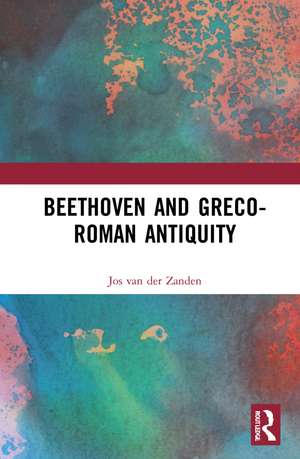Beethoven and Greco-Roman Antiquity
Autor Jos van der Zandenen Limba Engleză Paperback – 31 mai 2023
| Toate formatele și edițiile | Preț | Express |
|---|---|---|
| Paperback (1) | 389.11 lei 6-8 săpt. | |
| Taylor & Francis – 31 mai 2023 | 389.11 lei 6-8 săpt. | |
| Hardback (1) | 1000.27 lei 6-8 săpt. | |
| Taylor & Francis – 30 sep 2021 | 1000.27 lei 6-8 săpt. |
Preț: 389.11 lei
Nou
Puncte Express: 584
Preț estimativ în valută:
74.47€ • 77.46$ • 61.48£
74.47€ • 77.46$ • 61.48£
Carte tipărită la comandă
Livrare economică 14-28 aprilie
Preluare comenzi: 021 569.72.76
Specificații
ISBN-13: 9781032047102
ISBN-10: 1032047100
Pagini: 288
Ilustrații: 33 Halftones, black and white; 33 Illustrations, black and white
Dimensiuni: 156 x 234 x 15 mm
Greutate: 0.44 kg
Ediția:1
Editura: Taylor & Francis
Colecția Routledge
Locul publicării:Oxford, United Kingdom
ISBN-10: 1032047100
Pagini: 288
Ilustrații: 33 Halftones, black and white; 33 Illustrations, black and white
Dimensiuni: 156 x 234 x 15 mm
Greutate: 0.44 kg
Ediția:1
Editura: Taylor & Francis
Colecția Routledge
Locul publicării:Oxford, United Kingdom
Public țintă
Postgraduate and Undergraduate AdvancedNotă biografică
Jos van der Zanden for many years was a producer and director of broadcasting for Dutch Public Radio (the classical music radio station) and throughout this time published many articles on Beethoven, as well as books (also on Schubert and Mozart). In 2020, he completed his PhD at the University of Manchester.
Cuprins
Chapter 1 Introduction
1.1 Aims and Objectives
1.2 The Quest for Bildung
1.3 Scholarly Writing
1.4 Method and Structure
Chapter 2 Influences I: Bonn
2.1 Bonn Politics
2.2 The French Revolution and Ancient Rome
2.3 Brutus and Republicanism
2.4 The Czerny Enigma
2.5 Nepos
2.6 Cicero and Feder
2.7 German Grossmannsucht
2.8 The Creed of the Illuminati: ‘Read the Ancients’
2.9 Summary
Chapter 3 Influences II: Vienna
3.1 Winckelmann and German Classicism
3.2 Goethe and Schiller
3.3 Ancient Texts Available in German
3.4 Educational Material
3.5 Antiquity in Opera
3.6 Painting and Sculpture
3.7 Summary
Chapter 4 Greek Literature I: Homer
4.1 The Translations by Johann Heinrich Voss
4.2 References in Primary Sources
4.3 The Canon in Egerton 2795
4.4 Nephew Karl’s Studies
4.5 Beethoven’s Copy of the Odyssey
4.6 Passages that Caught Beethoven’s Eye
4.7 The Role of Schindler
4.8 Summary
4.9 Appendix: Markings in Homer’s Odyssey
Chapter 5 Greek Literature II: Xenophon, Euripides, and Greek Poetry
5.1 Xenophon and Platonism
5.2 Euripides
5.3 The Greek Anthology
5.4 Summary
Chapter 6 Literature from Imperial Rome: Plutarch, Horace, and Tacitus
6.1 The Schirach Edition
6.2 References in the Sources
6.3 Plutarch’s Characters
6.4 Some Effects on Beethoven
6.5 Horace
6.6 Tacitus
6.7 Summary
Chapter 7 The Role of Hellenistic Philosophy
7.1 Platonism and Stoicism
7.2 Beethoven’s Reading
7.3 Passions
7.4 Moral Issues
7.5 Summary
Chapter 8 Antiquity in Beethoven’s Music
8.1 A Survey of the Works
8.2 Bacchus
8.3 Unresolved Dissonances
8.4 Other Opera Plans
8.5 Socrates
8.6 The Problem of Der Sieg des Kreuzes
Chapter 9 Closing Observations
9.1 Overview and Analysis of the Findings
9.2 Implications of the Source Findings
9.3 Possible Ramifications for the Music
9.4 Conclusions and Recommendations
1.1 Aims and Objectives
1.2 The Quest for Bildung
1.3 Scholarly Writing
1.4 Method and Structure
Chapter 2 Influences I: Bonn
2.1 Bonn Politics
2.2 The French Revolution and Ancient Rome
2.3 Brutus and Republicanism
2.4 The Czerny Enigma
2.5 Nepos
2.6 Cicero and Feder
2.7 German Grossmannsucht
2.8 The Creed of the Illuminati: ‘Read the Ancients’
2.9 Summary
Chapter 3 Influences II: Vienna
3.1 Winckelmann and German Classicism
3.2 Goethe and Schiller
3.3 Ancient Texts Available in German
3.4 Educational Material
3.5 Antiquity in Opera
3.6 Painting and Sculpture
3.7 Summary
Chapter 4 Greek Literature I: Homer
4.1 The Translations by Johann Heinrich Voss
4.2 References in Primary Sources
4.3 The Canon in Egerton 2795
4.4 Nephew Karl’s Studies
4.5 Beethoven’s Copy of the Odyssey
4.6 Passages that Caught Beethoven’s Eye
4.7 The Role of Schindler
4.8 Summary
4.9 Appendix: Markings in Homer’s Odyssey
Chapter 5 Greek Literature II: Xenophon, Euripides, and Greek Poetry
5.1 Xenophon and Platonism
5.2 Euripides
5.3 The Greek Anthology
5.4 Summary
Chapter 6 Literature from Imperial Rome: Plutarch, Horace, and Tacitus
6.1 The Schirach Edition
6.2 References in the Sources
6.3 Plutarch’s Characters
6.4 Some Effects on Beethoven
6.5 Horace
6.6 Tacitus
6.7 Summary
Chapter 7 The Role of Hellenistic Philosophy
7.1 Platonism and Stoicism
7.2 Beethoven’s Reading
7.3 Passions
7.4 Moral Issues
7.5 Summary
Chapter 8 Antiquity in Beethoven’s Music
8.1 A Survey of the Works
8.2 Bacchus
8.3 Unresolved Dissonances
8.4 Other Opera Plans
8.5 Socrates
8.6 The Problem of Der Sieg des Kreuzes
Chapter 9 Closing Observations
9.1 Overview and Analysis of the Findings
9.2 Implications of the Source Findings
9.3 Possible Ramifications for the Music
9.4 Conclusions and Recommendations
Descriere
The author demonstrates that Beethoven’s engagement with Greco-Roman culture was deep and ongoing, and that it ventured beyond the non-committal. Drawing on a comprehensive investigation of primary sources he examines what Beethoven knew of such topics like history, art, politics and philosophy of antiquity.
